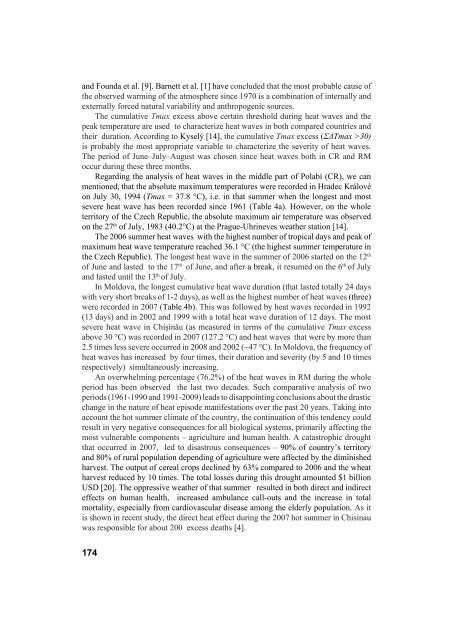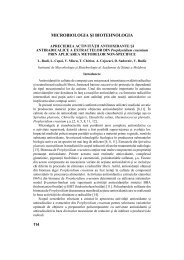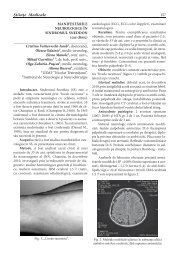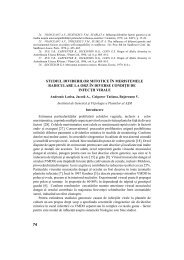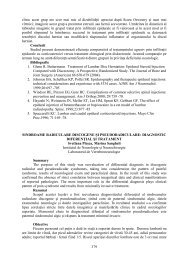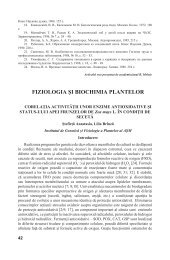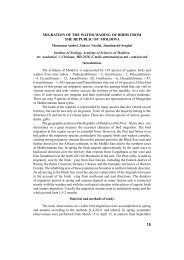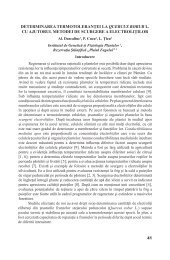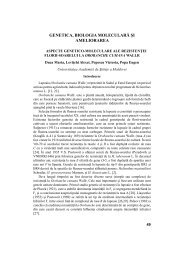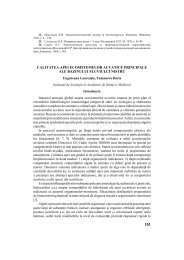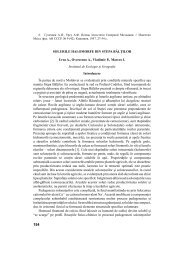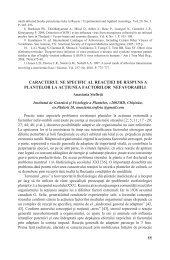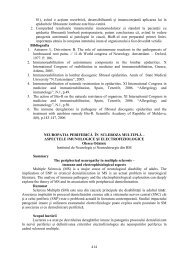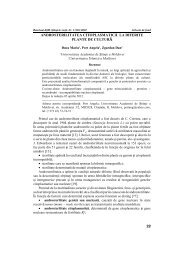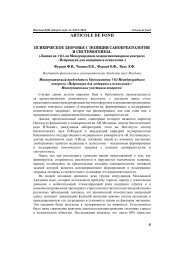209 CUPRINS
209 CUPRINS
209 CUPRINS
Create successful ePaper yourself
Turn your PDF publications into a flip-book with our unique Google optimized e-Paper software.
and Founda et al. [9]. Barnett et al. [1] have concluded that the most probable cause of<br />
the observed warming of the atmosphere since 1970 is a combination of internally and<br />
externally forced natural variability and anthropogenic sources.<br />
The cumulative Tmax excess above certain threshold during heat waves and the<br />
peak temperature are used to characterize heat waves in both compared countries and<br />
their duration. According to Kyselý [14], the cumulative Tmax excess (ΣΔTmax >30)<br />
is probably the most appropriate variable to characterize the severity of heat waves.<br />
The period of June–July–August was chosen since heat waves both in CR and RM<br />
occur during these three months.<br />
Regarding the analysis of heat waves in the middle part of Polabí (CR), we can<br />
mentioned, that the absolute maximum temperatures were recorded in Hradec Králové<br />
on July 30, 1994 (Tmax = 37.8 °C), i.e. in that summer when the longest and most<br />
severe heat wave has been recorded since 1961 (Table 4a). However, on the whole<br />
territory of the Czech Republic, the absolute maximum air temperature was observed<br />
on the 27 th of July, 1983 (40.2°C) at the Prague-Uhrineves weather station [14].<br />
The 2006 summer heat waves with the highest number of tropical days and peak of<br />
maximum heat wave temperature reached 36.1 °C (the highest summer temperature in<br />
the Czech Republic). The longest heat wave in the summer of 2006 started on the 12 th<br />
of June and lasted to the 17 th of June, and after a break, it resumed on the 6 th of July<br />
and lasted until the 13 th of July.<br />
In Moldova, the longest cumulative heat wave duration (that lasted totally 24 days<br />
with very short breaks of 1-2 days), as well as the highest number of heat waves (three)<br />
were recorded in 2007 (Table 4b). This was followed by heat waves recorded in 1992<br />
(13 days) and in 2002 and 1999 with a total heat wave duration of 12 days. The most<br />
severe heat wave in Chişinău (as measured in terms of the cumulative Tmax excess<br />
above 30 °C) was recorded in 2007 (127.2 °C) and heat waves that were by more than<br />
2.5 times less severe occurred in 2008 and 2002 (~47 °C). In Moldova, the frequency of<br />
heat waves has increased by four times, their duration and severity (by 5 and 10 times<br />
respectively) simultaneously increasing.<br />
An overwhelming percentage (76.2%) of the heat waves in RM during the whole<br />
period has been observed the last two decades. Such comparative analysis of two<br />
periods (1961-1990 and 1991-2009) leads to disappointing conclusions about the drastic<br />
change in the nature of heat episode manifestations over the past 20 years. Taking into<br />
account the hot summer climate of the country, the continuation of this tendency could<br />
result in very negative consequences for all biological systems, primarily affecting the<br />
most vulnerable components – agriculture and human health. A catastrophic drought<br />
that occurred in 2007, led to disastrous consequences – 90% of country’s territory<br />
and 80% of rural population depending of agriculture were affected by the diminished<br />
harvest. The output of cereal crops declined by 63% compared to 2006 and the wheat<br />
harvest reduced by 10 times. The total losses during this drought amounted $1 billion<br />
USD [20]. The oppressive weather of that summer resulted in both direct and indirect<br />
effects on human health, increased ambulance call-outs and the increase in total<br />
mortality, especially from cardiovascular disease among the elderly population. As it<br />
is shown in recent study, the direct heat effect during the 2007 hot summer in Chisinau<br />
was responsible for about 200 excess deaths [4].<br />
174


